State Campaigns to End Extreme Sentences
The Sentencing Project partners with states across the country to advance sentencing reforms that promote community safety and reduce ineffective overreliance on incarceration.
Explore each of our state campaigns below.
State Campaigns
The Sentencing Project supports state-level advocacy efforts across the country, with a particular focus in six jurisdictions: Connecticut, Maryland, Massachusetts, Michigan, New York, and Rhode Island.
We advocate for the adoption of evidence-based sentencing policies that make the criminal legal system more equitable and humane and advance reforms that promote community safety while reducing ineffective overreliance on incarceration. State campaign activities include public education through digital ads and strategic communications, lobbying, coalition leadership, public event coordination, collaborating with incarcerated individuals and groups, and tailored research and data analysis. We also fund local grassroots efforts with our Racial Justice Fund. These efforts build on existing second look laws such as judicial review of sentences and expanded parole opportunities.
Scroll down to learn more about each of our campaigns.
Connecticut: Expanding Access to Sentencing Relief
Connecticut’s existing mechanisms allowing people to seek sentencing relief have restrictions that severely limit who can access relief. Current law denies people serving mandatory minimum sentences from being resentenced and includes excessive wait times for re-petitioning for sentence modification.
-

Testimony in Support of Broad Second Look Resentencing
Read the testimonyThe Sentencing Project advocated and testified for the passage of Connecticut’s Act Concerning Sentence Modification Eligibility, which sought to expand the state’s second look process by removing the excessive restrictions currently in place. The bill ultimately didn’t pass this year, but The Sentencing Project will continue to engage to push for Second Look reforms in Connecticut.
-

Hartford Courant Opinion: I was one of the lucky ones. Here’s how Connecticut's Second Look law is falling short.
Read the Op-EdEddie Deleon was sentenced at the age of 21 following his participation in a robbery in 1991 in which his accomplice committed murder. He served 32 years and 9 months of incarceration before he obtained sentencing relief under Connecticut’s second look law. Learn more about how the sentencing relief Eddie was able to access is denied to others who seek rehabilitation and transformation while incarcerated in Connecticut.
Maryland: Second Look
This year, thanks to 44 House co-sponsors have joined the effort, and the growing momentum from crime victims, faith leaders, attorneys, state’s attorneys from Baltimore City and Prince George’s County, and voters in Maryland and across the country, Governor Wes Moore signed into law the Maryland Second Look Act. The bill expands the work of the Juvenile Restoration Act by establishing judicial sentencing review for people who were 18 to 25 years at the time of their sentencing and have already served 20 years. The Sentencing Project will continue to work with the Maryland Second Look Coalition to advocate for the removal of the limitations in the legislation, including the bar on second look for people serving life without parole and those convicted of sex-related offenses.
-

AFR Opinion: Maryland Has the Worst Racial Disparities in Incarceration - The Second Look Act Can Help Fix It
Read the Op-EdMaryland has some of the worst racial disparities in incarceration across the country, as nearly 72% of Maryland’s incarcerated population is Black and 82% of Black Marylanders who are serving life sentences were under the age of 25 at the time of their offense, which is the highest rate in the nation. Learn how Maryland can address racial disparities in incarceration from our coalition partner Yanet Amanuel at ACLU-MD.
-

Testimony in Support of Maryland’s Second Look Act
Read the testimonyThe Sentencing Project’s Warren Allen testified before the Maryland Senate Judicial Proceedings Committee in support of Second Look legislation that would create an important tool in making meaningful opportunities for persons sentenced to Maryland prisons.
Michigan: Second Look
Michigan has made strides to downsize its prison population, but these efforts have fallen short with 30% of the state’s prison population having already served at least 10 years and nearly half of those with extreme sentences being at least 50 years old. The Sentencing Project and its partners spearheaded robust legislation, Michigan’s Second Look bill, which was introduced during the 2024 legislative session. The Michigan Second Look Coalition is currently working on new legislation that will expand opportunities for people to access court review of their sentences.
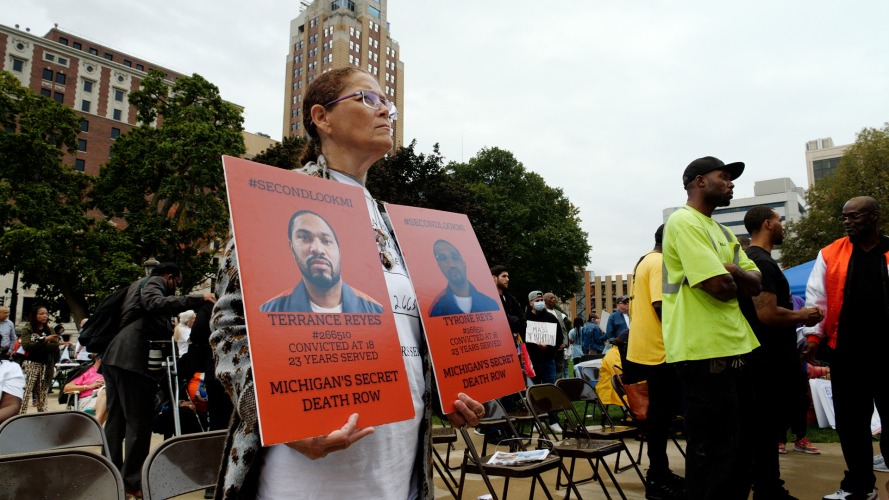
Testimony on Michigan’s Second Look Sentencing Act
Almost one-third of Michigan’s prison population has already served at least 10 years—a higher proportion than the national average. Reviewing the sentences of those incarcerated for 10 years or longer is a data-driven public safety approach.
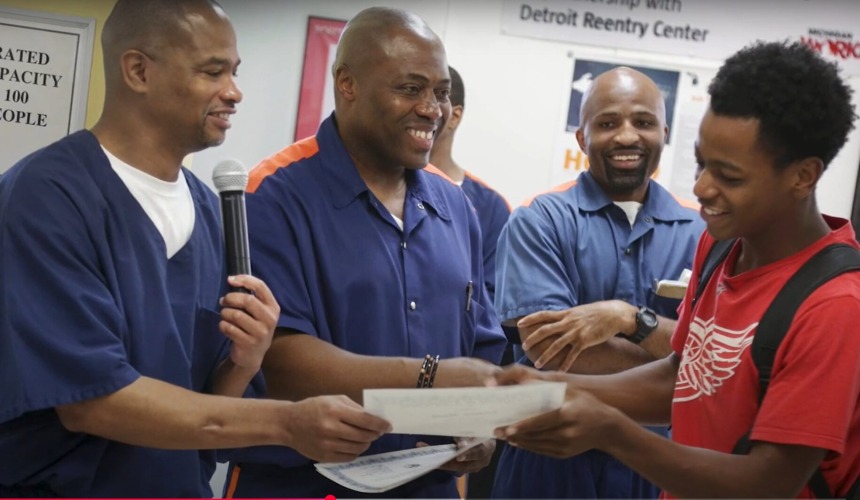
Hear from our incarcerated partners in Michigan
Are you the same person that you were 20 years ago? This powerful video explains why people serving life without parole sentences deserve a second look. Michael Tubbs, Everett Jackson, and Bernice Starks describe their personal transformation from when they first entered prison, and the work they are doing inside and out to better their community.
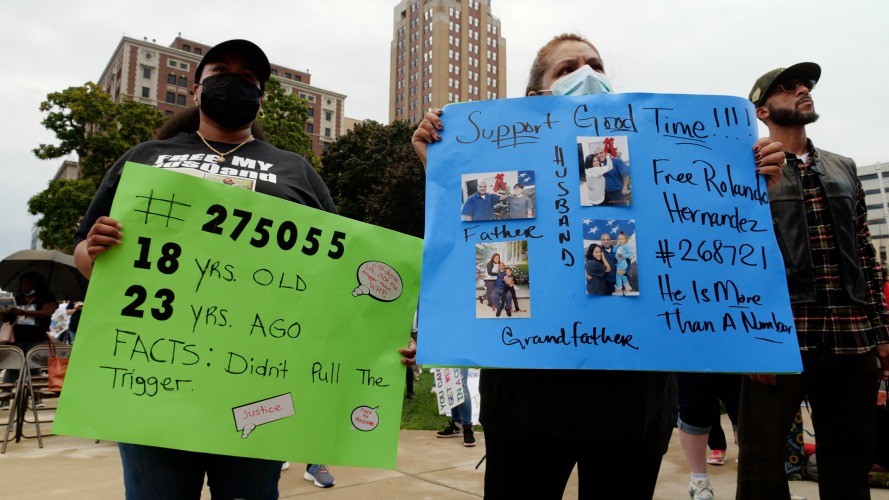
Join the Second Look Movement in Michigan!
Join us if you’re interested in contacting legislators, signing petitions, and aiding in the movement for second look in Michigan!
Michigan: Second Look
Michigan has made strides to downsize its prison population, but these efforts have fallen short with 30% of the state’s prison population having already served at least 10 years and nearly half of those with extreme sentences being at least 50 years old. The Sentencing Project and its partners spearheaded robust legislation, Michigan’s Second Look bill, which was introduced during the 2024 legislative session. The Michigan Second Look Coalition is currently working on new legislation that will expand opportunities for people to access court review of their sentences.

Hear from our incarcerated partners in Michigan
Are you the same person that you were 20 years ago? This powerful video explains why people serving life without parole sentences deserve a second look. Michael Tubbs, Everett Jackson, and Bernice Starks describe their personal transformation from when they first entered prison, and the work they are doing inside and out to better their community.

Testimony on Michigan’s Second Look Sentencing Act
Almost one-third of Michigan’s prison population has already served at least 10 years—a higher proportion than the national average. Reviewing the sentences of those incarcerated for 10 years or longer is a data-driven public safety approach.

Join the Second Look Movement in Michigan!
Join us if you’re interested in contacting legislators, signing petitions, and aiding in the movement for second look in Michigan!
Rhode Island: Second Look and Repealing Life Sentences
The Sentencing Project and its partners have long worked to bring impactful sentencing reform to Rhode Island, including supporting legislative reforms to establish a second look and review for sentences of life without the possibility of parole.
-

Letter in Support of the Rhode Island First Step Act
Read the letterDuring the 2025 legislative session, The Sentencing Project supported legislation that would establish the Rhode Island First Step Act to authorize a sentence reduction for certain persons completing their prison sentence, including elders and persons deemed terminally ill.
-

Letter in Support of Parole Board Membership Reform
Read the letterDuring the 2025 legislative session, The Sentencing Project supported legislation to authorize the appointment of a formerly incarcerated person to the parole board.
-

The Providence Journal: State lawmakers field bills to empower judges to rethink long sentences
Click to read the articleState lawmakers are weighing a proposal that would allow people serving long sentences to ask a judge for a “second look” at their punishment after 10 years.
-

Rhode Island Supreme Court Affirms Emerging Adult Sentencing Reform
Learn moreMario Monteiro has gained the right to a meaningful opportunity for parole thanks to a recent Rhode Island Supreme Court ruling. The Sentencing Project joined with the Juvenile Law Center, the Gault Center, the National Association for Criminal Defense Lawyers, and Prison Policy Initiative in an amicus brief in support of parole review at 20 years.
DC: Defending and Advancing Sentencing Justice
The District’s ambitious approach to sentencing reform, including one of the strongest second look laws in the country, has repeatedly placed it in Congress’s crosshairs. The Sentencing Project advocates for the District’s autonomy to pursue evidence-based sentencing reform laws and policies. The Sentencing Project also urges the DC Council to build on the District’s sentencing reform successes, by expanding eligibility for second looks and abolishing mandatory minimum sentences.
-
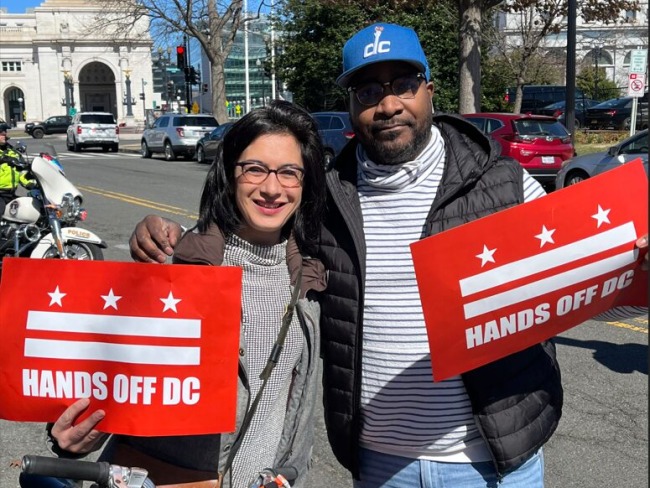
Letter in Support of Washington DC’s Revised Criminal Code Act of 2022
Read the letterMany of the bill’s provisions would bring DC’s criminal penalties closer in line with criminological evidence on public safety, improve fairness and proportionality and advance racial justice in the criminal legal system.
-
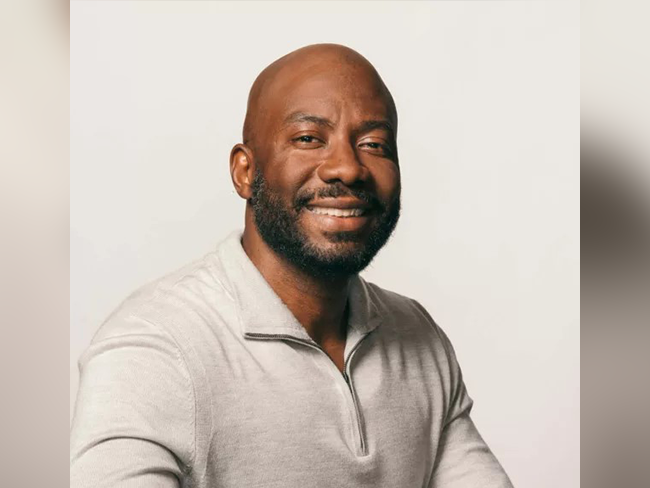
Randall McNeil and DC’s Second Look Law
Learn more about Randall's storyWith the expansion of the Incarceration Reduction Amendment Act in 2020, Randall McNeil was finally given an opportunity to petition for his freedom. In August 2022, McNeil was granted his freedom after 24 years in prison.
-
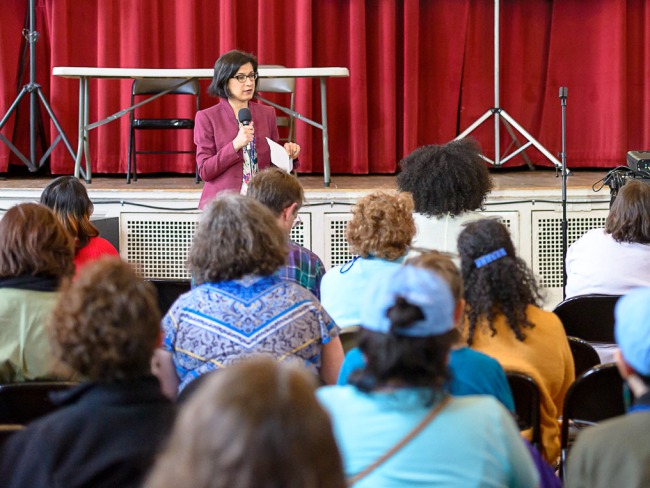
Testimony on DC’s Criminal Code Reform Commission
Read our testimonyThe Council of the District of Columbia should protect the Criminal Code Reform Commission, which strengthens DC lawmaking and helps advance the cause of justice, equity, and autonomy.
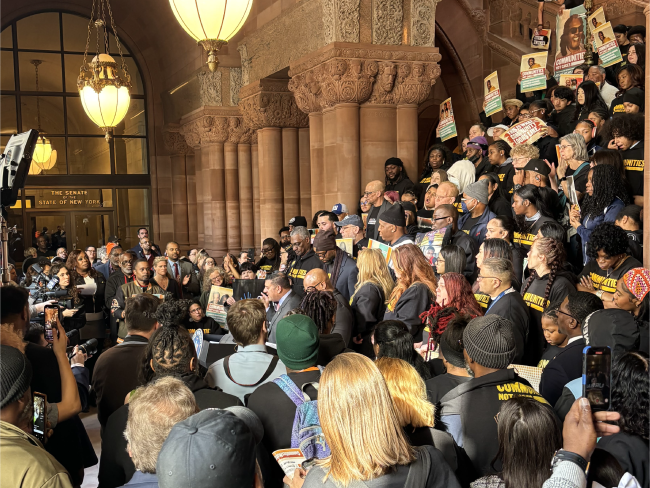
New York: Second Look, Mandatory Minimums, Elder Parole, and Good Time
It has been over 50 years since the Attica uprising, but the issues of injustice that caused it have not been adequately addressed, so we will be pushing for passage of five bills in the 2025 legislative session. Our campaign associate, Warren Allen, who is himself a second look recipient, is working with Communities Not Cages and the Release Aging People in Prison campaign on five bills: The Second Look Act, Earned Time Act, Fair and Timely Parole Act, Elder Parole Act, and Marvin Mayfield Act (to eliminate mandatory minimum sentences). These bills taken together address a graying prison population, racial inequities due to mandatory sentence application, and allow rehabilitated persons a second chance at life.
Massachusetts: Second Look and Abolishing LWOP, Joint Venture
Massacushetts has a strong movement to address the core issues that drive mass incarceration such as repealing life without the possibility of parole, advancing second look, and curbing extreme and racially disparate sentencing such as through the state’s felony murder law. The Sentencing Project is playing a key role in educating the legislature about the necessity of these reforms and will be joining allies to fight for their passage.
-
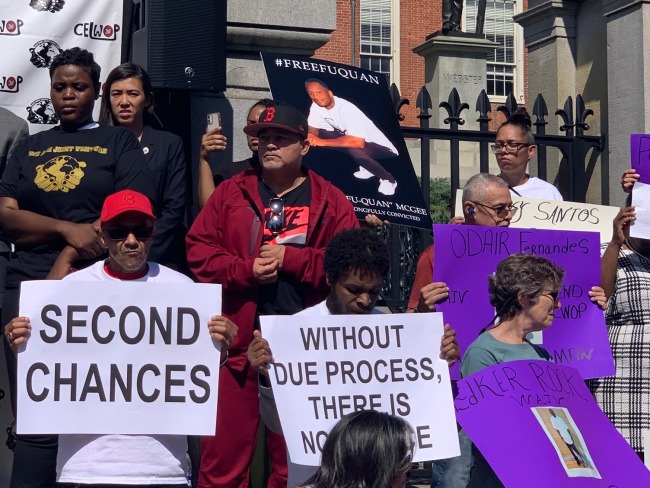
Testimony in Support of Second Look Legislation in Massachusetts
Read our testimonyThe Sentencing Project’s Nazgol Ghandnoosh testified before the Massachusetts Legislature in support of Second Look legislation that would allow people 25 or younger at the time of their offense to petition for resentencing after 10 to 15 years of imprisonment and allow others to the same after 12 to 18 years of imprisonment.
-
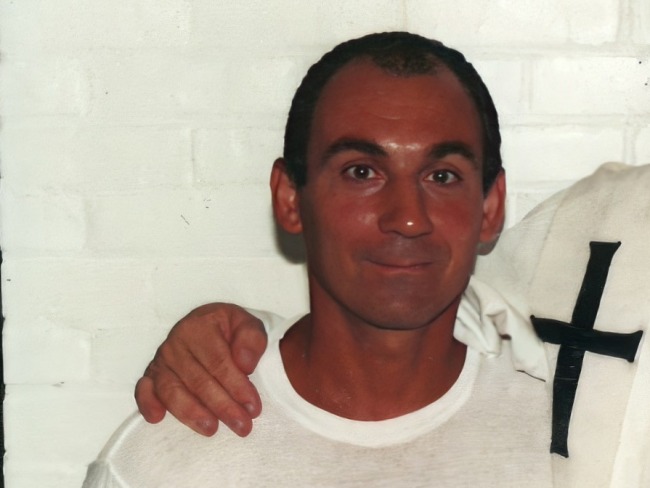
William Florentino
Read Left to Die in PrisonWilliam Florentino was sentenced to LWOP in Massachusetts at 20-years-old following his participation in a robbery in 1977 in which his accomplice committed murder. He has been in prison for over 46 years and is now an elderly man. Learn more about William and other emerging adults (age 25 and younger) who are sentenced to life without parole.
Support from The Sentencing Project has been invaluable. From policy insights to expert testimony, The Sentencing Project has played a vital role in our campaign to overhaul New York's unjust sentencing laws. By providing a national perspective, The Sentencing Project has also effectively demonstrated multi-state momentum for these issues and convinced many stakeholders in New York that the time is now.


